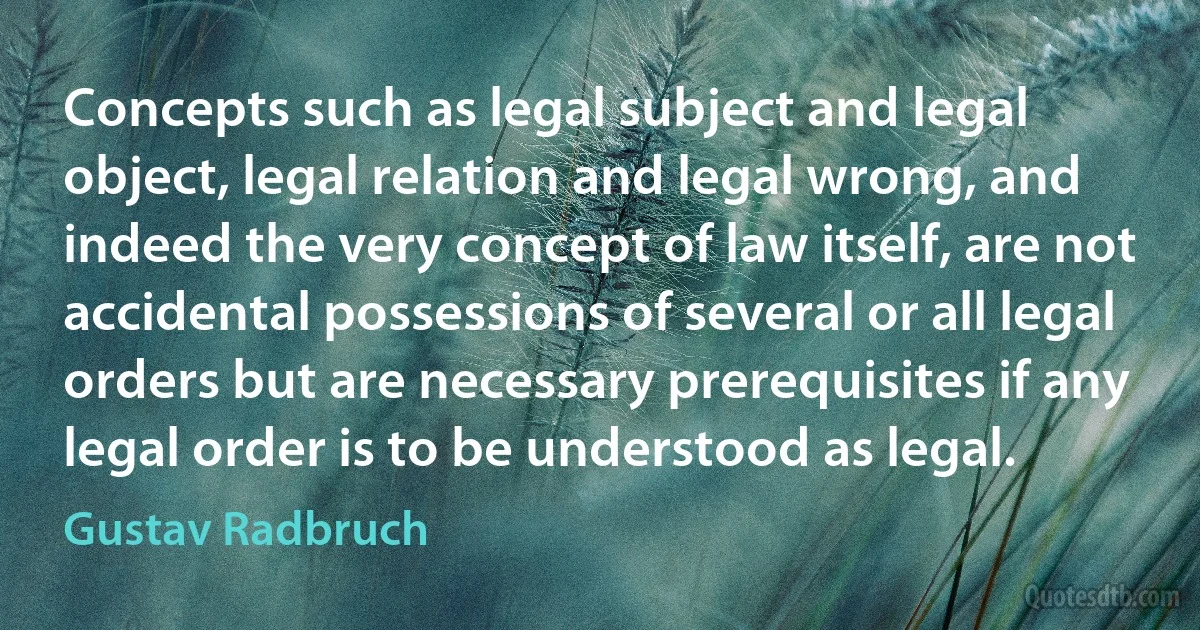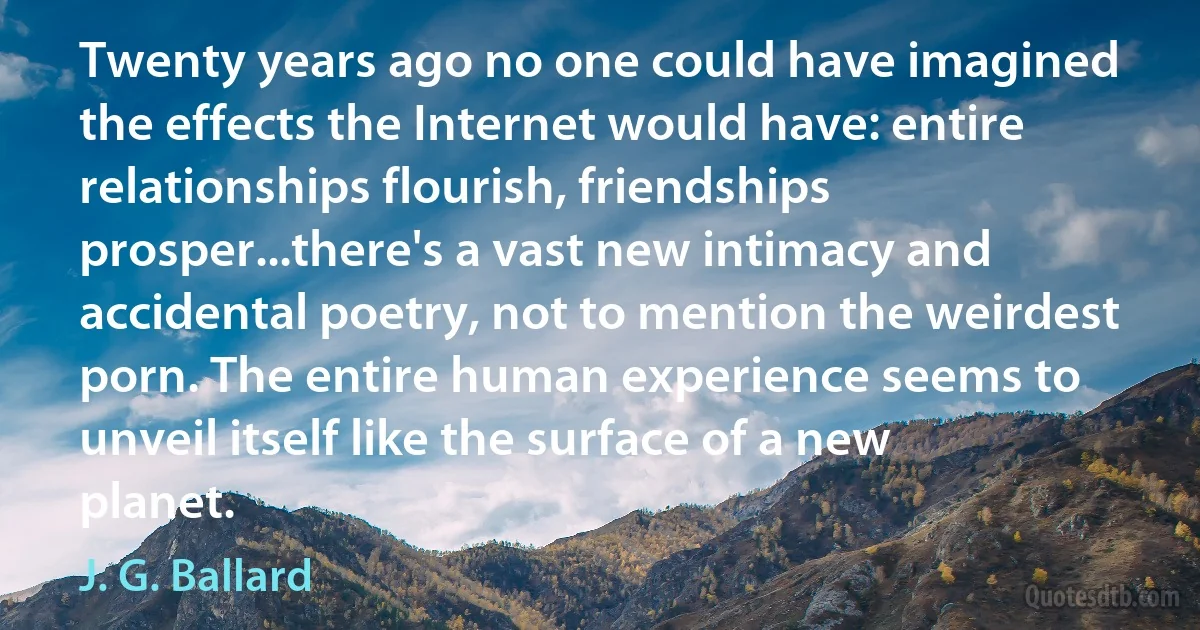Accidental Quotes - page 7
What the Democratic Party has most liked to say about itself-that it is the party of the working man, the voice of the oppressed, the tribune of the people-loses some of its strut in the light of a rather long list of inconvenient facts, chiefly having to do with slavery and race. Such facts as these: that the Democrats were the party that championed chattel bondage, backed an expansionist war to expand slavery's realm, and corrupted the Supreme Court in order to open the western territories to the cancer. The party's Southern wing then led the nation into civil war in defense of slavery while its Northern wing did its best to stymie the administration of Abraham Lincoln, widely regarded by the Democrats as an accidental, even illegitimate, president. Thereafter, the party embraced Jim Crow as slavery's next-best substitute, elected a president who imposed segregation on the federal workforce, and remained the chief opponent of racial equality...

Allen C. Guelzo
Her claim was denied repeatedly on the assumption that she really wanted the birth control to prevent pregnancy. She's gay, so clearly polycystic ovarian syndrome was a much more urgent concern than accidental pregnancy. After months of paying over $100 out of pocket, she just couldn't afford her medication anymore and had to stop taking it. I learned about all of this when I walked out of a test and got a message from her that in the middle of her final exam period she'd been in the emergency room all night in excruciating pain. ... Without her taking the birth control, a massive cyst the size of a tennis ball had grown on her ovary. She had to have surgery to remove her entire ovary.

Sandra Fluke
Well, I think it is accidental. It's just something I started doing naturally and it had a lot to do with reading. I think that Dylan Thomas, his prose and poetry, was a big influence on me. Just his use of words... He would use so many odd words: like these three- and four-syllable words that you just don't normally hear. And they're not used in a manner that sets the text apart from the reader. Rather they're drawing the reader in. It's entirely based on the alliteration of the word itself-onomatopoeia and things like that. I feel like a lot of the words I use don't stick out in the song because they keep the feel of the song in mind. The rhythm-that's the primary thing. They're put in there for rhythm and alliteration as much as they are for meaning. And as long as they are not used extraneously, they're real lightning rods for people listening to the lyrics. If the words are really helping out the rhythm of the song then all they're going to do is draw the listener in even more.

Colin Meloy
I believe that it may happen that one will succeed, and one must not begin to despair, even though defeated here and there and even though one sometimes feels a kind of decay, though things go differently from the expected, it is necessary to take heart again and new courage. For the great things are not done by impulse, but by a series of small things brought together. And great things are not something accidental, but must certainly be willed. What is drawing How does one learn it It is working through an invisible iron wall that seems to stand between what one feels and what one can do.

Vincent van Gogh
Inherent in human beings are possibilities which we now can't even entertain. Before the space launch, space travel to many of us was the stuff of fantasy, of science fiction. We know what it is to explore the limits of what we consider to be a human being, but if we were to transform our understanding of ourselves, if we were to transform what we knew a human being to be, new possibilities of expression would open. We could function in a more creative way. In a more humane way. In the past we were transformed by the thrust of evolution or by accidental forces. This time we should transform ourselves with a conscious, committed degree of self-awareness.

Werner Erhard
A. No matter what you do, you're always hearing something.
Q. You mean to say that all of the accidental environmental sounds that surround the piece become a part of the realization of the score?
A. Yes, that's right.
Q. In that case, even the chairs are musical?
A. Yes. In fact, there is perhaps nothing that is not musical. Perhaps there's no moment in life that's not musical.

George Brecht
Neither is it accidental that the Upanishads contain no internal evidence as to when, where or by whom they were composed. Their very thesis is that we dwell in the midst of a timeless eternity. With everything so indissolubly united that particular areas or places are of no concern. Who might be the author of an idea or a way of communicating it must be of no importance whatsoever, since truth is truth.

Robert T. Oliver
The "bleeding hearts” who want love without anger, relationship without conflict, harmony without contradictions, are forced to create an illusory world of unambivalent love. ... It is not accidental that such perfect persons (who never question their own motives, or suspect their hidden ideology or self-interest) make other feel tainted and guilty. Every sentimental sermon is served with a side-dish of guilt. In their presence, honest doubt is named cynicism, anger is called evil, and ambivalence is castigated as craziness.

Sam Keen
It has been fashionable in the twentieth century not only to debunk myth, ... but to pretend that that reasonable and educated people could avoid the embarrassment of religion and the risk of metaphysics by sticking close to demonstrable facts and testable hypotheses. However, in the course of reducing our beliefs and hopes to certainties and proofs, we impoverished and deluded ourselves. The modern anti-myth reduced human life to a story without a point, a tale told by an idiot, a process without a purpose, a journey without a goal, an affair without a climax (Godot never comes), an accidental collision of mindless atoms. ... We have hardly noticed that economics, technology and politics have become the new myth and metaphysic. We haven't avoided myth and metaphysics, only created demeaning ones.

Sam Keen
I feel convinced that my preservation was not altogether accidental, but was indeed the work of divine power. An inventor's endeavor is essentially life saving. Whether he harnesses forces, improves devices, or provides new comforts and conveniences, he is adding to the safety of our existence. He is also better qualified than the average individual to protect himself in peril, for he is observant and resourceful.

Nikola Tesla
The emergence of new media (and therefore artistic) formats is certainly interesting. But etching information into copper plates is just as exciting. We think that the perpetual return of 'the new', to cite Walter Benjamin, is nothing to write home about - except perhaps for the slave-drivers in the fashion industry. We've never been interested in the new just in itself, but in the accidental occurrence. In the moment where things don't tally, where productive confusion arises. That's why in the final analysis, although we've laughed a lot with Stewart Home, we even reject the meta-criticism of innovation-fixation articulated in 'neoism'. The new sorts itself out when it lands in the museum. Finito.

Johannes Grenzfurthner
The Individual living in this unity has a moral "life; possesses a value that consists in this substantiality alone. Sophocles in his Antigone, says, "The divine commands are not of yesterday, nor of to-day; no, they have an infinite existence, and no one could say whence they came." The laws of morality are not accidental, but are the essentially Rational. It is the very object of the State that what is essential in the practical activity of men, and in their dispositions, should be duly recognized; that it should have a manifest existence, and maintain its position. It is the absolute interest of Reason that this moral Whole should exist; and herein lies the justification and merit of heroes who have founded states, however rude these may have been. In the history of the World, only those peoples can come under our notice which form a state. For it must be understood that this latter is the realization of Freedom, i.e. of the absolute final aim, and that it exists for its own sake.

Georg Wilhelm Friedrich Hegel
I ask you to stop and think for a moment what it would mean to have nuclear weapons in so many hands, in the hands of countries large and small, stable and unstable, responsible and irresponsible, scattered throughout the world. There would be no rest for anyone then, no stability, no real security, and no chance of effective disarmament. There would only be the increased chance of accidental war, and an increased necessity for the great powers to involve themselves in what otherwise would be local conflicts.

John F. Kennedy
It is no accident that all democracies have put a high estimate upon education; that schooling has been their first care and enduring charge. Only through education can equality of opportunity be anything more than a phrase. Accidental inequalities of birth, wealth, and learning are always tending to restrict the opportunities of some as compared with those of others. Only free and continued education can counteract those forces which are always at work to restore, in however changed a form, feudal oligarchy. Democracy has to be born anew every generation, and education is its midwife.

John Dewey
To explain these concepts I've made a three-part, uneven division of our consciousness. The smallest, the first attention, or the consciousness that every normal person has developed in order to deal with the daily world, encompasses the awareness of the physical body. Another larger portion, the second attention, is the awareness we need in order to perceive our luminous cocoon and to act as luminous beings. The second attention is brought forth through deliberate training or by an accidental trauma, and it encompasses the awareness of the luminous body. The last portion, which is the largest, is the third attention. It's an immeasurable consciousness which engages undefinable aspects of the awareness of the physical and the luminous bodies. The battlefield of warriors is the second attention, which is something like a training ground for reaching the third attention.

Carlos Castaneda
The origin of things, considered not as leading to anything, but in itself, contains the idea of First, the end of things that of Second, the process mediating between them that of Third. A philosophy which emphasises the idea of the One, is generally a dualistic philosophy in which the conception of Second receives exaggerated attention: for this One (though of course involving the idea of First) is always the other of a manifold which is not one. The idea of the Many, because variety is arbitrariness and arbitrariness is repudiation of any Secondness, has for its principal component the conception of First. In psychology Feeling is First, Sense of reaction Second, General conception Third, or mediation. In biology, the idea of arbitrary sporting is First, heredity is Second, the process whereby the accidental characters become fixed is Third. Chance is First, Law is Second, the tendency to take habits is Third. Mind is First, Matter is Second, Evolution is Third.

Charles Sanders Peirce
Into the New World my first message. You who gave the Ashram,
And you who gave two lives,
Proclaim.
Builders and warriors, strengthen the steps.
Reader, if you have not grasped - read again,
after a while.
The predestined is not accidental,
The leaves fall in their time.
And winter is but the harbinger of spring.
All is revealed; all is attainable.
I will cover you with My shield, if you but tend to your labors.
I have spoken.

Nicholas Roerich
[Donald Horne's] central tenet, that his homeland was a lucky strike consistently mismanaged by second-rate politicians, caught on as a dogmatic aid to national self-doubt. As I read on through our recent and gratifyingly rich heritage of commentary and memoir, it became clearer to me all the time that we hadn't become a prosperous and reasonably equable democracy by the accidental dispensation of benevolent nature and a favourable geographical position. The country had been built, by clever people. Our constitution itself was the work of people who had studied history. They were readers of newspapers and periodicals, they were eternal students in the best sense, they were bookish people. They had built a bookish nation. But, as so often has been the case with Australia's consciousness of itself, the problem was to realise it.

Clive James



